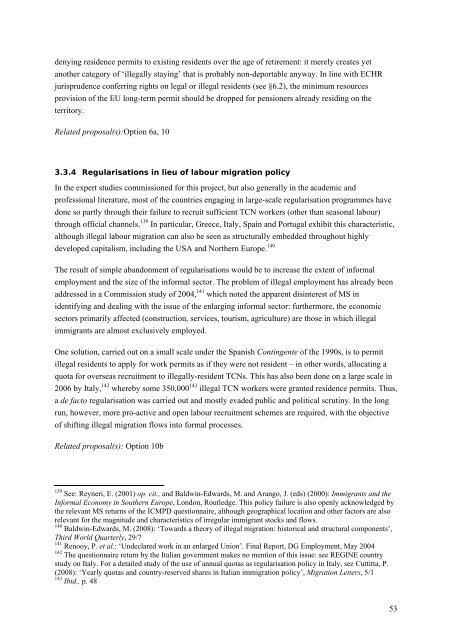REGINE Regularisations in Europe Final Report - European ...
REGINE Regularisations in Europe Final Report - European ...
REGINE Regularisations in Europe Final Report - European ...
You also want an ePaper? Increase the reach of your titles
YUMPU automatically turns print PDFs into web optimized ePapers that Google loves.
deny<strong>in</strong>g residence permits to exist<strong>in</strong>g residents over the age of retirement: it merely creates yet<br />
another category of ‘illegally stay<strong>in</strong>g’ that is probably non-deportable anyway. In l<strong>in</strong>e with ECHR<br />
jurisprudence conferr<strong>in</strong>g rights on legal or illegal residents (see §6.2), the m<strong>in</strong>imum resources<br />
provision of the EU long-term permit should be dropped for pensioners already resid<strong>in</strong>g on the<br />
territory.<br />
Related proposal(s):Option 6a, 10<br />
3.3.4 <strong>Regularisations</strong> <strong>in</strong> lieu of labour migration policy<br />
In the expert studies commissioned for this project, but also generally <strong>in</strong> the academic and<br />
professional literature, most of the countries engag<strong>in</strong>g <strong>in</strong> large-scale regularisation programmes have<br />
done so partly through their failure to recruit sufficient TCN workers (other than seasonal labour)<br />
through official channels. 139 In particular, Greece, Italy, Spa<strong>in</strong> and Portugal exhibit this characteristic,<br />
although illegal labour migration can also be seen as structurally embedded throughout highly<br />
developed capitalism, <strong>in</strong>clud<strong>in</strong>g the USA and Northern <strong>Europe</strong>. 140<br />
The result of simple abandonment of regularisations would be to <strong>in</strong>crease the extent of <strong>in</strong>formal<br />
employment and the size of the <strong>in</strong>formal sector. The problem of illegal employment has already been<br />
addressed <strong>in</strong> a Commission study of 2004, 141 which noted the apparent dis<strong>in</strong>terest of MS <strong>in</strong><br />
identify<strong>in</strong>g and deal<strong>in</strong>g with the issue of the enlarg<strong>in</strong>g <strong>in</strong>formal sector: furthermore, the economic<br />
sectors primarily affected (construction, services, tourism, agriculture) are those <strong>in</strong> which illegal<br />
immigrants are almost exclusively employed.<br />
One solution, carried out on a small scale under the Spanish Cont<strong>in</strong>gente of the 1990s, is to permit<br />
illegal residents to apply for work permits as if they were not resident – <strong>in</strong> other words, allocat<strong>in</strong>g a<br />
quota for overseas recruitment to illegally-resident TCNs. This has also been done on a large scale <strong>in</strong><br />
2006 by Italy, 142 whereby some 350,000 143 illegal TCN workers were granted residence permits. Thus,<br />
a de facto regularisation was carried out and mostly evaded public and political scrut<strong>in</strong>y. In the long<br />
run, however, more pro-active and open labour recruitment schemes are required, with the objective<br />
of shift<strong>in</strong>g illegal migration flows <strong>in</strong>to formal processes.<br />
Related proposal(s): Option 10b<br />
139 See: Reyneri, E. (2001) op. cit., and Baldw<strong>in</strong>-Edwards, M. and Arango, J. (eds) (2000): Immigrants and the<br />
Informal Economy <strong>in</strong> Southern <strong>Europe</strong>, London, Routledge. This policy failure is also openly acknowledged by<br />
the relevant MS returns of the ICMPD questionnaire, although geographical location and other factors are also<br />
relevant for the magnitude and characteristics of irregular immigrant stocks and flows.<br />
140 Baldw<strong>in</strong>-Edwards, M. (2008): ‘Towards a theory of illegal migration: historical and structural components’,<br />
Third World Quarterly, 29/7<br />
141 Renooy, P. et al.: ‘Undeclared work <strong>in</strong> an enlarged Union’. F<strong>in</strong>al <strong>Report</strong>, DG Employment, May 2004<br />
142 The questionnaire return by the Italian government makes no mention of this issue: see <strong>REGINE</strong> country<br />
study on Italy. For a detailed study of the use of annual quotas as regularisation policy <strong>in</strong> Italy, see Cuttitta, P.<br />
(2008): ‘Yearly quotas and country-reserved shares <strong>in</strong> Italian immigration policy’, Migration Letters, 5/1<br />
143 Ibid., p. 48<br />
53
















